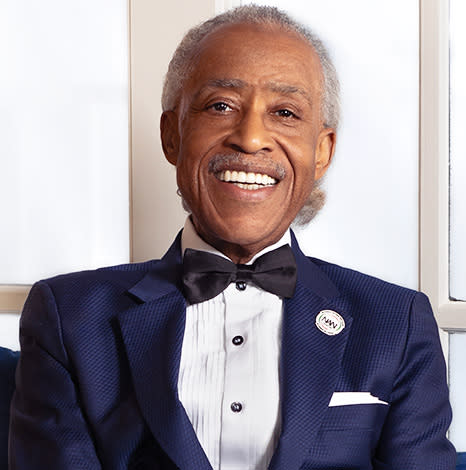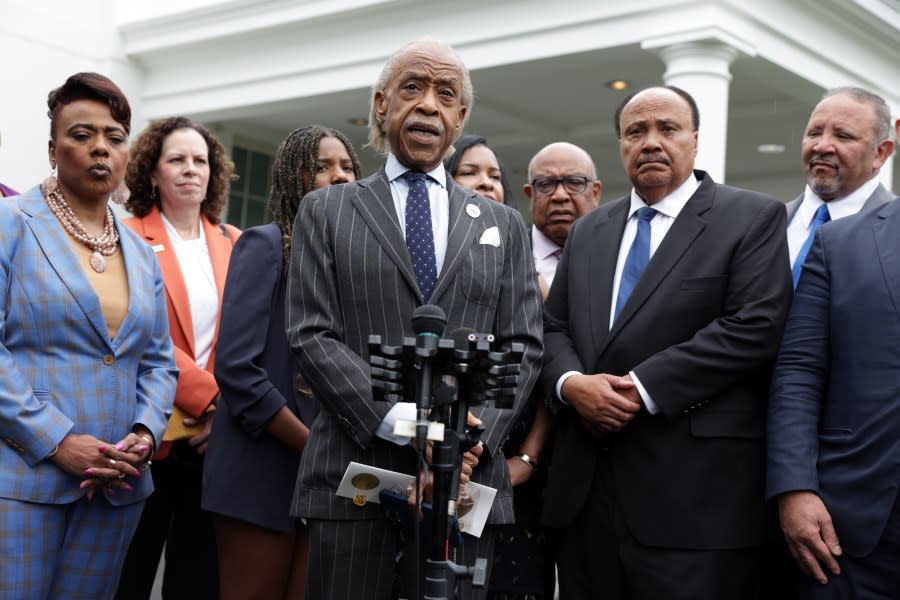TheGrio Awards, Justice Icon: Al Sharpton
- Oops!Something went wrong.Please try again later.
The longtime freedom fighter takes no days off as he continues to rally for the civil rights of marginalized communities.
For decades, the Rev. Al Sharpton’s advocacy has placed him at the forefront of seeking equality and peace for Black families who have fallen victim to racial violence and an unfair justice system.
Sharpton is well known for garnering national attention and bringing public awareness to racial adversities such as police brutality, America’s housing crisis, hateful acts against Black individuals, and other actions that target the civil rights of Black Americans.
The most recent case the activist is placing a spotlight on is the death in Mississippi of Dexter Wade, a Black man who was run over by a police officer in March. Wade was buried though no one informed his mother of the fatal encounter or the burial. After reporting her son missing in March and searching for him, she found out nearly six months later that he was dead and buried. Sharpton issued a call to action for the Department of Justice to investigate Wade’s case and the Jackson, Mississippi, police department’s procedures, tactics and culture.
“What happened to Dexter Wade is one of the most disturbing things I have ever heard,” Sharpton wrote in a statement. “This is truly as bad as it gets. You have an off-duty officer who fatally strikes a Black man with an official vehicle, then a department that says they cannot locate a next of kin while his mother begs and pleads with anyone who will listen to find her son. The details clearly show this is a cover-up — plain and simple.”
In proper Sharpton form, he sheds light on incidents and places them high on the public’s radar to evoke pressure on political leaders and government officials to respond. Sharpton’s influence has made him instrumental in the development of several high-profile cases: George Floyd, Tyre Nichols, Breonna Taylor, Trayvon Martin, Eric Garner, Rayshard Brooks and others.

Sharpton stands on the shoulders of past changemakers in the civil rights arena. Dr. Martin Luther King Jr., Rep. John Lewis, his mentor, the Rev. Jesse Jackson, and others played a role in Sharpton’s unwavering commitment to civil rights and advancing Black communities through nonviolent resistance.
At 69 years old, Sharpton still stands strong as the go-to advocate who continues to publicly protest, and there are no signs he is slowing down.
In February, the documentary “Loudmouth” premiered on BET, exploring his life’s work of fighting for social justice. He hosts a weekend news talk show, “PoliticsNation,” on MSNBC. He also has his daily national radio show, “Keepin’ It Real,” where he keeps listeners abreast of major political events and updates. He is the author of several books including, “Rise Up: Confronting a Country at the Crossroads,” “The Rejected Stone: Al Sharpton and the Path to American Leadership,” “Righteous Troublemakers: Untold Stories of the Social Justice Movement in America” and many others. He was a guest lecturer at Tennessee State University. He also has been honored with multiple honorary doctorate degrees from Bethune-Cookman University, Fisk University and Medgar Evers College, to name a few.
He is the founder of the National Action Network (NAN), a not-for-profit civil rights organization. NAN, which Sharpton created in 1991, promotes an agenda focusing on criminal justice reform, police accountability, crisis intake and victim assistance, voting rights, corporate responsibility and pension diversity, youth leadership and technology accessibility.
NAN has nearly 100 chapters nationwide where members meet and organize about issues impacting their local communities. The work of NAN has been recognized and praised by other changemakers, including former President Barack Obama, who in 2007 deemed Sharpton “the voice of the voiceless and a champion for the downtrodden” at one of the organization’s conventions.
Sharpton is relentless in his efforts to empower and be a voice for marginalized communities – an initiative instilled in him when he was a child.
The New York native was born in 1954 in Queens. The future crusader’s introduction to preaching started early. Sharpton began preaching at 4 years old, and his first sermon was at the Washington Temple Church of God in Christ. Before reaching his teens, Sharpton found himself preaching throughout the country with the guidance of Bishop F.D. Washington and the Rev. Dr. Bill Jones, two pastors Sharpton’s mother connected him with. From there, he was introduced to Rev. Jesse Jackson in 1967. When Sharpton reached 13, he was appointed by Jackson and the Rev. William Augustus Jones as the youth director for the New York chapter of the Southern Christian Leadership Conference’s Operation Breadbasket. His experience in that role laid the foundation for his training in civil disobedience and direct action, which he would later adopt into his current practices.
Sharpton’s desire to fight for civil rights grew as he was surrounded by powerful leaders. He learned from the Rev. William A. Jones, Hosea Williams, the Rev. Ralph Abernathy, Dr. Wyatt Tee Walker and other influential activists. Sharpton founded his first civil rights organization, the National Youth Movement, at 16. He eventually met James Brown and grew closer to the musician. In 1973, Brown adopted Sharpton as his godson. Sharpton’s frequent association with the “Godfather of Soul” taught him how to captivate the public.
“I would watch what moves and what songs excited people, and I would take notes,” Sharpton told The New York Times. “Because you’ve got to keep people’s attention.”
Sharpton put the knowledge he absorbed from his influential mentors to the test with his first major case in 1986. Three Black men who were looking for help after their car broke down stopped at a New York pizza shop in Howard Beach, an all-white neighborhood in Queens, New York. The men were approached by white teenagers, and an argument started. The teenagers left and returned with a mob to attack the Black men. Michael Griffith, 23, one of the men chased by the white mob, was killed after getting struck by a car. Sharpton made it his duty to organize several protests rallying for justice for the men. He and over a thousand protesters marched through Howard Beach. In the end, three of the attackers were convicted of second-degree manslaughter.
Sharpton’s success at mobilizing demonstrators and contributing to the mobbers’ conviction set him on track to fight for other cases.

In 1989, Sharpton conducted several protests after a 16-year-old teenager, Yusuf Hawkins, was attacked by a white mob, shot and then killed in Brooklyn. His public display of marching for justice garnered him more public attention. Even after being stabbed in the chest during one of the demonstrations, he did not let that incident deter him from pushing forward. He campaigned for the Senate in 1992 and 1994 and lost both times. He ran for New York City mayor in 1997 and ran for president in 2004, which he did not win either.
Although he was never elected to office, those setbacks never dissuaded him from continuing his social justice advocacy. He continued to march. He continued to protest. He continued to be the spokesperson behind a podium or in the streets for Black families longing for justice and accountability.
His push to evoke change raised awareness about injustices for families, including those of Abner Louima, Amadou Diallo, Sean Bell, Michael Brown and many more. As part of his annual commemoration of Dr. King’s March on Washington, over 200,000 people attended in 2020 to demand police reform, and the event was led by families of Black individuals who lost their lives to police brutality.
Sharpton’s influence runs deep and is highly praised. In 2014, Vanity Fair called him “arguably the country’s most influential civil-rights leader.” Sharpton lives up to that proclamation as he continues his long strides forward despite the violence, multiple imprisonments for civil disobedience and other obstacles he has endured.
Sharpton’s legacy lives in his persistent mission of achieving justice where it is due and, in return, brings society closer to systemic equality.
Never miss a beat: Get our daily stories straight to your inbox with theGrio’s newsletter.
The post TheGrio Awards, Justice Icon: Al Sharpton appeared first on TheGrio.

